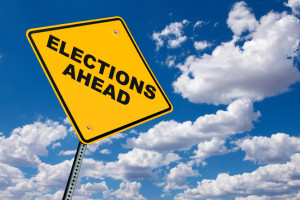 By Steve Brawner
By Steve Brawner
© 2016 by Steve Brawner Communications, Inc.
If you’re one of the millions of Americans enthusiastically supporting Donald Trump or Hillary Clinton, then let’s be clear: Your candidate won your party’s nomination, fair and square.
The rest of you may be wondering how two candidates with historically high unfavorable ratings became the nominees. And the answer is, because 9 percent of Americans voted for them.
According to a recent New York Times analysis, only 9 percent of 324 million Americans have actually cast a ballot for either Clinton or Trump. Almost a third of Americans can’t vote because they are children, noncitizens and felons. Another 88 million are eligible adults who never vote, while 73 million vote in general elections but not party primaries. In other words, roughly 161 million people could have voted but didn’t. That left only 60 million people, out of 324 million, who voted in the primaries, and of those, Trump and Clinton won the most votes among the many candidates originally competing.
Arkansas’ turnout mirrored the country’s. Out of 3 million residents and 1.7 million registered voters, only 633,000 Arkansans cast a ballot. Clinton was the choice of 146,000, or about 4.9 percent of all Arkansans. Trump’s 135,000 votes came from 4.5 percent of us. So as with the rest of the country, 9 percent of Arkansans have voted for either Clinton or Trump.
It’s not hard to see how someone opposed by most Americans could slip through the process. If the field is crowded like it was this year, a candidate can become one of two people with a realistic shot of becoming president even if he or she is the first choice of only 5 percent.
It wasn’t long ago that presidential nominees were chosen by party leaders and delegates at party conventions. Now, most states use a primary process where voters decide. Like many states, Arkansas has open primaries where any voter can cast a ballot in either party, regardless of how much they support that party.
That’s made it harder for the two parties – technically private organizations – to enforce discipline. Trump, who only recently became a Republican, won the nomination over 16 longtime Republicans. In Arkansas, party leaders supported everyone but him: first, former governor Mike Huckabee and then, when he dropped out, mostly Sen. Marco Rubio with some supporting Sen. Ted Cruz. Trump won 33 percent of the vote, Cruz won 31 percent and Rubio won 25 percent. According to an analysis by Talk Business & Politics, many voters were irregular voters – not longtime, committed Republicans.
Meanwhile, Bernie Sanders competed hard for the Democratic nomination even though he’s an independent socialist, not a Democrat. There’s been a big stink after online hackers revealed some party officials favored Clinton, but is it any wonder they would prefer the Democrat over the non-Democrat? Sanders’ supporters didn’t think so, which is one reason why they disrupted the Democratic National Convention and interrupted Clinton’s speech there numerous times.
Whichever party loses this election might have to ask tough questions about how much party discipline should be enforced. Should parties be as democratic as possible? If so, they’re going to lose some control of their own process. Already, the Democrats have decided to reduce the number of superdelegates – party leaders who get their own vote and who overwhelmingly favored Clinton this year. That change will lessen the elites’ power, but it also means that the non-Democrat would have come a lot closer to winning the Democratic nomination this year.
Most Americans probably would support the process being more democratic, not less. That being the case, they should become more active in primaries, when some of the most important choices are made. If not, a small minority of voters will make that choice.
For the foreseeable future, general election results in Arkansas will be relatively predictable: in this red state, the Republican candidate probably will win except in pockets where the Democrat probably will win. The real competition often is in the primaries, when voters can select those particular Republicans and Democrats.
So if you are only going to vote one time in an election year, maybe you should skip the general election and vote only in the primaries. The next ones are in May 2018.
Related: Don’t be a reptile this election.
I am a registered Democrat but, IMO, Kasich should have been the GOP nominee.
Voter turnout is unbelievably low in the U.S.–probably the lowest in all current democracies. We put up with lots of voter suppression, bar many people from voting for life when they are convicted of crimes, and make the voting process unnecessarily difficult and unappealing. Plus the whole political process is so nasty that lots of good potential candidates don’t want to drag themselves and their families thru all of the garbage and filth that they would be exposed to. We wind up getting candidates who are bought and paid for by big special interests since that’s the only way they can get the money it takes to run. Our politics are rotten, so no wonder our people are totally apathetic.